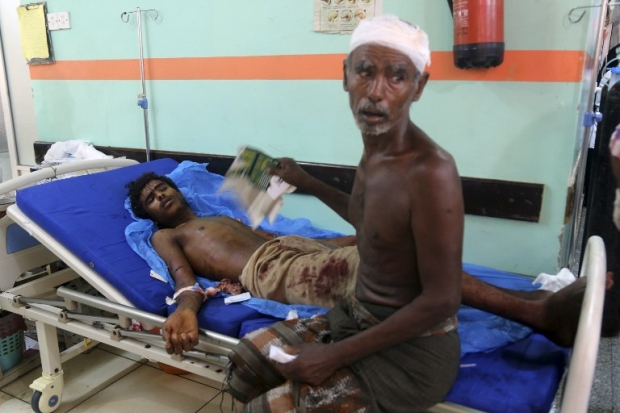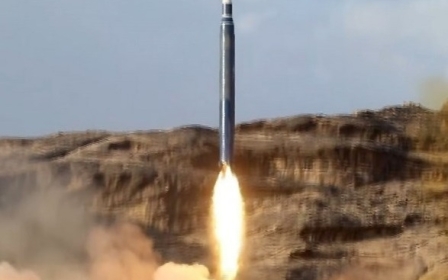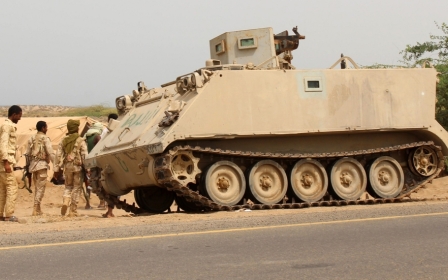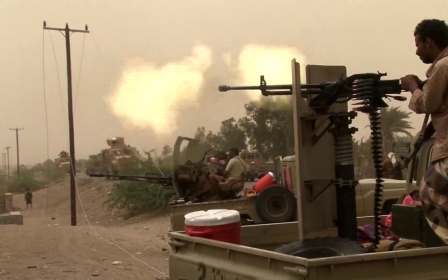60 dead after air strike hits hospital and market in Hodeidah

SANAA - Air strikes thought to be conducted by the Saudi-led coalition have hit a hospital's entrance, fishing port and fish market in the Yemeni city of Hodeidah, killing scores of people.
A source at Hodeidah's health office told Middle East Eye that 60 people were killed in the strikes on Thursday, with more than 100 wounded.
According to witnesses, the strike at the hospital hit as casualties were taken there from the port and the market.
"While I was coming back to my house to chew qat with my family, I heard a warplane hover over Hodeidah," Alaa Thabet, a 38-year-old resident of Hodeidah city, told MEE.
"Then I heard an air strike target the fish market and the buzzing of the warplane was clearer after the attack."
I cannot forget this scene, which left a bad impression about the Saudis
- Alaa Thabet, Hodeidah resident
"After that people went to take the casualties to several hospitals, including al-Thawra Hospital, but the warplane returned to hover again," he added.
Thabet said no one expected the warplane to target the entrance of a hospital, which is usually crowded with civilians, but it did.
He added that it seemed as if the warplanes were chasing the casualties and the second batch of strikes killed more than the first.
"After the second air strike people were praying Allah would take revenge on the Saudis," Thabet said.
"When I went nearer to see the impact, I saw a motorcyclist who had been killed but his hands did not leave the motorcycle. I cannot forget this scene, which left a bad impression about the Saudis."
Help needed
The source in Hodeidah's health office said medical workers were struggling to respond to patients' needs.
"The hospitals suffer from lack of medicines, equipment and doctors because of the war, and yesterday the doctors could not help all casualties," he told MEE.
"I appeal to international organisations to support the health system in Hodeidah, to help people when the Saudis target them, as this is not the first time that air strikes target people."
The International Committee of the Red Cross said on Twitter it was sending medical equipment to al-Thawra Hospital to treat those in critical condition following the attack.
Staff working for Save the Children, which runs a diphtheria treatment centre in the hospital, described the situation after the strikes as "chaos".
“A bomb exploded just outside the hospital, on the street," one staff member said. "Then there was another explosion towards the back. I saw people running and bodies in the street.”
Coalition denial
Despite the Houthis' lack of an air force, the Saudi-led coalition laid the blame at the rebels' door, and insisted it was not behind the strike.
"The coalition did not carry out any operations in Hodeidah today," the coalition spokesman, Colonel Turki al-Malki, told Al-Arabiya television. "The Houthi militia are behind killing of civilians in Hodeidah on Thursday," he said.
Pro-Yemeni government activists and media accused the Houthis of targeting the civilians with ballistic missiles, suggesting the rebels did so to make the coaliton look bad.
Ali al-Makosh, a pro-government fighter in Marib province told MEE: "The Houthis usually exploit the hovering of the Saudi-led warplanes to target civilians on purpose, in order to trick the world into thinking that the coalition targets civilians."
Meanwhile, the United Nations said it will invite the parties involved in Yemen’s conflict for talks on 6 September.
UN Special Envoy to Yemen Martin Griffiths told the UN Security Council that "a political solution" to end the war in Yemen is "available" and urged world powers to support the new push for peace negotiations.
"These consultations will provide the opportunity for the parties, among other things, to discuss the framework for negotiations, relevant confidence-building measures and specific plans for moving the process forward," said Griffiths.
Strategic port city
Saudi Arabia, the United Arab Emirates and regional allies have been fighting in Yemen with Western backing for more than three years against the Iran-aligned Houthis.
The Houthis control much of north Yemen including the capital Sanaa and drove its Saudi-backed government into exile in 2014.
On Tuesday, the Houthis said they were unilaterally halting attacks in the Red Sea for two weeks to support peace efforts.
This came a few days after Saudi Arabia suspended oil exports through a strategic Red Sea channel, amid Houthi attacks on crude tankers on 25 July.
About 70 percent of Yemen's food imports flow through Hodeidah port; about 8.4 million Yemenis are said by aid workers to be on the verge of starvation.
The Houthis have offered to hand over management of the port to the world body, according to the United Nations, but the coalition says the group must quit the western coast.
On Friday, the UN's World Health Organisation said Yemen may be on the brink of a new cholera epidemic, with greater chance of a high death rate due to widespread malnutrition.
"We're calling on all parties to the conflict ... for three full days of tranquility and to lay down arms to allow us to vaccinate the civilian population for cholera," WHO emergency response chief Peter Salama said.
New MEE newsletter: Jerusalem Dispatch
Sign up to get the latest insights and analysis on Israel-Palestine, alongside Turkey Unpacked and other MEE newsletters
Middle East Eye delivers independent and unrivalled coverage and analysis of the Middle East, North Africa and beyond. To learn more about republishing this content and the associated fees, please fill out this form. More about MEE can be found here.






